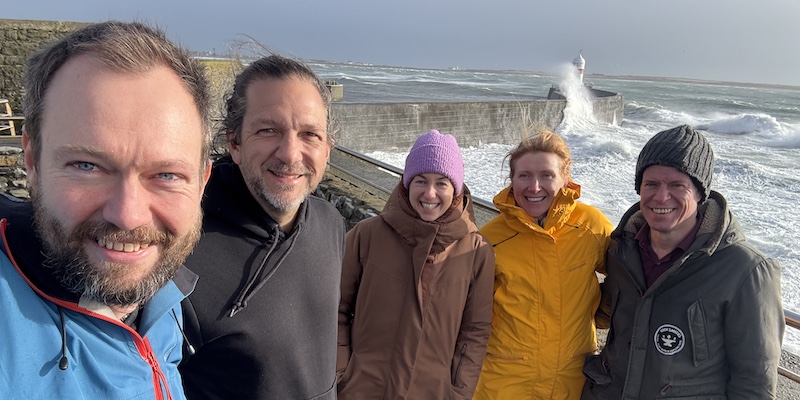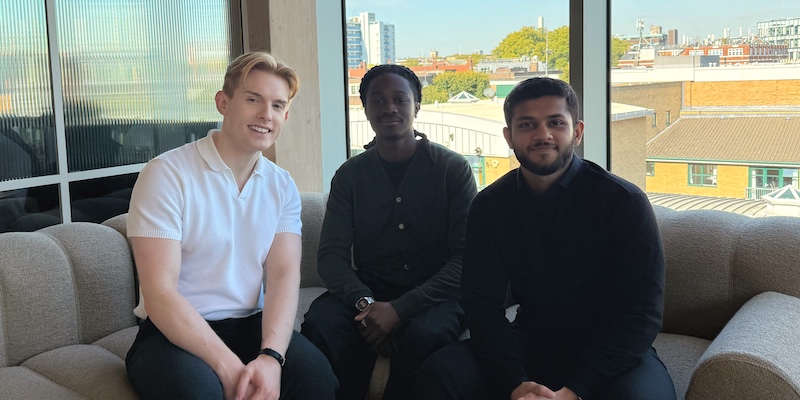
10 Questions with Head Set
TW: Violence In 2011 Kate Parkinson was covering the civil war in Libya, when a rocket propelled grenade seriously injured her cameraman. Despite having had training, she felt totally unprepared to respond to the situation.
"When I needed it, my training totally failed me. It failed me in more ways than one, because not only was I not able to recall any of my first aid skills, but also none of the training I'd received had prepared me for the psychological impact of being faced with such a traumatic event."
This experience is what inspired Kate and her co-founder Aela to start Head Set - The only immersive learning ecosystem for journalists that empowers them to practice skills and learn from peers.
BGV invested in Head Set in 2020 and since then, they’ve hit some incredible milestones, including 80 people accessing their civil unrest VR SMART module. In this interview, Kate touches on being an impact-driven business, talks about her vision for the future of Head Set, and shares some valuable insights into what it takes to be a successful startup founder.
The following conversation has been edited for length and clarity. You can watch the full interview here.
Where did the idea for Head Set come from, where did your startup journey begin?
It's quite a story, and a very personal one. It all began in 2011, when my cameraman, who is now also my husband Olivier, and I were covering the civil war in Libya. He was really very seriously injured by a rocket propelled grenade - I sometimes forget to say that he survived, but he did! Thanks to the medics in the rebel forces. Had it been left up to me to save his life, he might not have made it. That's because in that moment I completely froze and I didn't have a clue what to do. In theory, I should have known as I had been trained, but theory and practice are two very different things. When I needed it, my training totally failed me. It failed me in more ways than one because not only was I not able to recall any of my first aid skills, but also none of the training I'd received had prepared me for the psychological impact of being faced with such a traumatic event. That's really how Head Set started. My co-founder Aela is also a journalist and our early research confirmed our assumption that the current training is in desperate need of innovation. Currently, the gold standard training that journalists receive is a three to five day residential course that combines theory with high stress simulation training. Journalists are meant to be sent on this training to refresh their skills every three years. In reality we've found that many journalists are heading out on dangerous assignments, with little or no training. We wanted to change that. We're developing Virtual Reality Safety, Emotion and Resilience Training, or VR SMART, which brings simulation training to journalists, wherever they are, and whenever they need it. Our training is more engaging, more accessible, and ultimately more effective in improving the safety and well being of journalists.
What do you hope Head Set will change?
In the short term, we're targeting the media. That’s the world we know, and can have the quickest impact in. However, ultimately we think our VR SMART experiences have the potential to change the way hostile environment training is delivered in many sectors. Hostile environment used to only refer to a conflict zone, but now we're seeing risks evolving - from street protests, to domestic terrorism, to climate crises, and a relentless stream of online threats. There are more employees than ever who are in need of high quality hostile environment training. We think that in VR SMART, we've got the solution.
Who are you hoping Head Set will help?
We started with journalists in mind and we hope that we can help news organisations and journalists improve their safety and wellbeing. However, as above, we see potential well beyond the media market. The traditional sectors that send their staff on this kind of hostile environment training include organisations like the media and humanitarian aid agencies, but also corporations who are sending staff on high risk assignments. By looking beyond the traditional hostile training market, we see a huge potential to help users beyond our initial targets, and create a new market.
What makes Head Set different from anything else out there?
Nobody is doing what we're doing. We're providing training that's not only different, but frankly better than anything else out there. Our VR SMART modules are more engaging, more effective, more accessible, and more economical than in-person simulation training. Some companies have been offering online solutions, particularly during the pandemic when in-person training just wasn't happening. These solutions are low cost and easier to access, but they lack any sort of user engagement or efficacy. And so we have a solution that is better than anything else on the market. There's a big need for this - organisations that operate in high risk environments need to de-risk their staff. It's a vital part of their duty of care, and is often mandated by their insurance companies. Yet many staff are never sent on training. We're not only offering a more cost effective solution, but we're also enabling organisation’s to train more staff. I firmly believe that what we're offering is a total game changer.
Are there any success stories you can share about the impact you have had on your users?
We're getting universally great feedback. Fundamentally we are an impact led business, so hearing how much our users love our VR experiences is really what keeps us going. Our Civil Unrest VR SMART module has been used by 80 people since it was launched in beta last year. That's across international media organisations, media and journalists, advocacy groups, universities and humanitarian organisations. And 100% of people we surveyed said they thought that our VR felt very real and they saw it as a really integral part of the training experience. We also found that 100% of people said that they felt better prepared to help and support colleagues who were struggling with stress and trauma. This is really validating for us, because this is an area where we really want to have an impact. When my husband was injured I had no idea of the impact that it was going to have on me psychologically. That was an impact that lasted for years. Both my co-founder and I, having worked in the media for a long time, have seen so many of our colleagues dealing with stress, trauma, and burnout over the years. We're really keen to make an impact there. It is incredibly validating when all of the people that we asked said that they found that our training had helped them prepare for dealing with and supporting colleagues who are struggling with these exact issues.
What’s one thing you wish you had known at the beginning of your startup journey?
I often say that I wish someone had told me that running a startup was as stressful as being shot at. I spent all these years doing really dangerous assignments, and it was highly stressful. But so is running a startup! It's incredibly difficult, as anybody who is running a startup will know.In all seriousness, I don't think there's one thing that I wish I'd known. Perhaps if somebody had told me how difficult it was going to be, I wouldn't have done it. And I'm really glad I'm doing it. Sometimes it's better not to know and learn these things along the way, isn't it?
What three qualities make a successful founder?
Firstly, I have to say that it is such a blessing to have a co-founder. Aela and I often say that we don't know how people do it on their own, especially at our stage where we're growing, and have more staff working for us. Having someone to help manage the situation, and someone to bounce all your stresses off is really invaluable. Aela and I speak at the beginning of every day and at the end of every day. And that's definitely something that I value immensely. In terms of what three qualities make a successful founder, I would say one is resilience. It's really tough and the odds of success are stacked against you. So having resilience in bucket loads is super important. Another skill or quality I think is great for a founder is determination and grit because without it, it would be really easy to give up. Having a company that is value led, and being determined to make an impact, is a real driving force for us at Head Set. I know for other impact led startups, that's the same.The last one is having a ‘get stuff done’ mindset. Otherwise, again, it would be so easy to give up, prevaricate, or to make things unnecessarily complicated. I think if you have a high bias to action, then you can yield the quickest results. These are all qualities that having thought about them through the lens of what makes a successful founder, also make good qualities of a journalist. I think for Aela and I, both being journalists has set us on a good path for being hopefully successful founders.
Aside from Head Set, are there any other tech for good companies you admire?
We admire anyone who's doing tech for good, because there are so many companies out there that are doing tech for bad. Anybody that is using technology to make a positive impact is somebody that I admire greatly. I have to say many of those fall within the BGV cohort. We were in the Spring 2020 cohort and there were some great companies there. We’ve always been big fans of Breathe Happy, but really anyone in the BGV cohort and the tech for good landscape is somebody that I admire.
If someone wanted to find out more about VR and how it can work within tech for good, where would you signpost them?
Come to us! I'd be very happy to talk to anyone who wants to understand better about how VR can be used in the space, especially if they've got VR related questions. If you’re more generally looking at tech for good then I would signpost them towards BGV. We value our time as BGV portfolio members greatly. We thoroughly enjoyed being part of the accelerator. It was a challenging time for everybody, as the whole world went into lockdown in Spring 2020. However, we learned so much and BGV has been instrumental in our journey.
What’s next for you and Head Set and how can people help?
We are at the start of the next chapter. We are really looking ahead to the next 18 months to two years and the milestones we're going to be hitting, it's a super exciting time. We're moving from the startup world to the scale up world.In terms of help, we’re currently raising a seed round so if anybody knows investors, or angels that would be interested in hearing more about our investment strategy, then please do put us in touch. When we close our round we'll be looking to hire. So if anybody in the BGV network can help us promote and share those roles, we'd be very grateful.Lastly, if anybody has any ideas of people that could benefit from our training or want to hear more about our VR smart solutions, then we'd love to talk to them.
Keep up to date with everything Head Set is doing on their website and on their LinkedIn profile.





